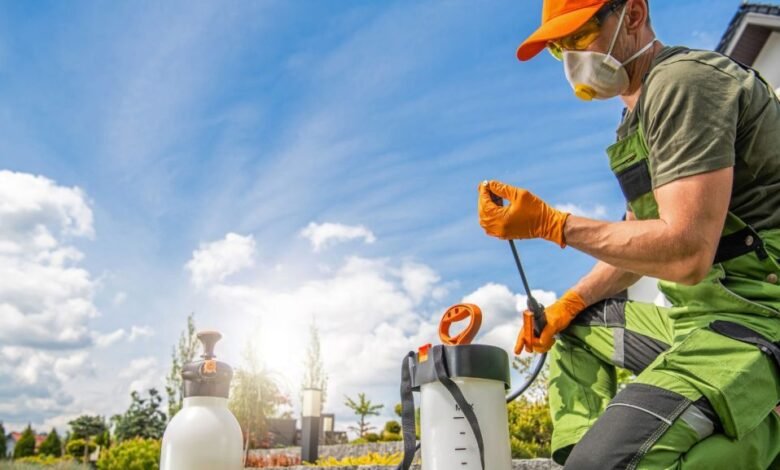Environmental Concerns Related to Pest Control

Managing pesky invaders was, at least until recently, a practice which involved the use of chemicals. That went on for decades. Naturally, that didn’t go well for the environment.
Good thing that in recent decades, more and more people have become environmentally aware. This puts pressure on businesses and the government to enforce regulations and limit certain bad practices.
On the other hand, to no surprise, pest infestations are bad for business. No one likes to go to a restaurant where there have been known bug sightings. Nobody wants to rent a home and discover bed bugs or cockroaches.
All these things make pest management, and, yes, sometimes the use of chemicals, crucial.
But, to make matters worse, some pests are becoming increasingly resistant to chemical pesticides. All this makes their use not only dangerous but also ineffective in certain cases.
That’s why there’s a rising demand for more eco-friendly pest control services worldwide. Yep, that’s where green pest control methods come in. And, as the trends show, they’re going to be an integral part of the future of the pest control industry.
Let’s explore all that in detail!
How Traditional Pest Control Methods Affect The Environment?
Chemical pest control was the norm. It’s how companies handled all bugs that dared make people’s homes their own. It’s how farmers kept them at bay to protect the harvest. Basically, it’s how the whole world approached this, up until recently, that is.
You had a chemical plant, it produced the needed pesticides, which in turn, were used by pest control companies. Sure, but then scientists began investigating the impact of said pesticides, not only on humans and animals but the soil as well. The public became more environmentally aware and demanded change. The governments worldwide, pressured by this, came up with rules and regulations.
Moreover, many funds were spent in coming up with new pest control measures. Ones that disposed of pesky invader problems in the most eco-friendly and least damaging way. Nowadays, we call these green pest control methods. It’s what most consumers want. And what the market dictates, the businesses adapt and learn to provide.
As a result, there are ventures which offer primary green pest management. Others, still offer clients that as an alternative to traditional methods. However, governments put lots of rules and regulations on pest control. It’s becoming more and more costly to produce chemicals, and, in turn, pricing goes up.
Chemical pest control also impacts agriculture. The first effect is that chemicals can soak into the ground and kill off other beneficial organisms in the soil. This decreases its fertility and eventually destroys the possibility of using said land for farming.
Its what happened to lots of places in the US, for example.
The next way it impacts agriculture is by ending up inside the harvest. In turn, some of the chemicals seep into the food that we end up eating and consuming. No need to say about the health implications of that.
The good news is that tech advancements in the sector are more and more focused on developing biopesticides.
One such is manufactured by the German giant Bayer AG and controls pests through pheromones. This interrupts their mating cycles and suppresses their numbers without negatively affecting the soil and the harvest.
This is a positive turn of events that is yet to see worldwide spread, as places in the developing world are still primarily using the old pest control methods.
Which Environmental Factors Impact Pest Management & How?
First off, global warming, or as certain people like to call it more neutrally, climate change. The warming of the planet has made it possible for pests, some of which were unknown in previous places of the world, to migrate and wreak havoc.
The Asian Giant Hornet and the malaria-inflicting tiger mosquito are just few examples.
Furthermore, increased global temperatures also mean increased insect activity. Yes, that includes procreation. So their numbers are going up globally. This would have been a good thing, if it was affecting bees, but sadly, their numbers are decreasing globally.
Floods and tsunamis, besides destroying properties, also contribute to global pest problems. The destruction of the rainforests for agricultural purposes destroys ecosystems but also causes certain pests to seek shelter elsewhere. Often closer to or inside big cities.
The Role of Consumer Awareness & Government Regulations
Protecting the planet is nowadays universally embraced as a cause. At least on the surface level. The rising environmental awareness is, however, a main driving force in how pest businesses conduct themselves.
Government rules and regulations are becoming only more strict. For example, the EU itself plans to be carbon neutral by 2050. That’s mainly because of the European Green Deal document.
Moreover, that target is legally binding to EU members, all thanks to the European Climate Law.
That deal mainly impacts the chemical plants, which produce the pesticides. As more and more regulations are enforced on these factories, the end up products end up costing more. Thus, the price of the pest management services goes up.
The other effect this has on the industry is that more and more businesses are turning towards green pest control practices. However, that’s not only driven by economic necessities but also by consumer awareness.
People in the last decade are becoming more aware of their impact on the planet, particularly Millennials and Gen Z. They demand more eco-conscious approach to everything and pest control is no exception.
As a result, many companies have started to offer green pest management services. Some, as their primary service, while others still offer them as an alternative to traditional means.
Conclusion
It wasn’t until people started becoming more environmentally conscious and became united that pest control companies and the governments started to listen.
Nowadays, ecology is a universally embraced concept. Thanks to our mutual effort, things are improving globally, at least in some areas.
Moreover, the rising need for green pest control methods is what’s going to force companies and researchers to drive the industry forward well into the future. Through that, we can only hope that not only the environment, but our tomorrow as a species will be protected.



